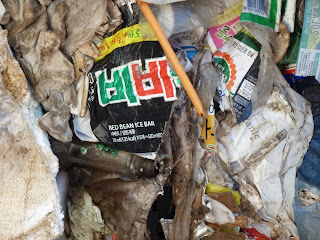Three Presidential Bets Favor Banning Single-Use Plastic Bags
Single-use plastic bags may soon become things of the past if Sen. Grace Poe, Sen. Miriam Defensor Santiago or former Sec. Mar Roxas is elected as 16th president of the Philippines on May 9.
The EcoWaste Coalition made this conclusion after going through the responses by the three presidential wannabes to the question raised by the group regarding plastic pollution.
As part of its effort to ascertain the presidential contenders’ positions on some burning waste and toxic issues, the EcoWaste Coalition asked this question to the candidates: “What policy measures will your administration take to stop the ‘plasticization’ of the oceans.”
The “plasticization of the oceans,” the group stressed, “is a disturbing scenario for a fish-eating country like the Philippines where fishing is also a major source of livelihood,” citing a recently-published study warning there will be more plastic by weight than fish by 2050 in the world’s oceans.
Poe, Santiago and Roxas expressed support for a national ban on single-use plastic bags as one of such measures to stop plastics from polluting the oceans.
The other two candidates, Vice-President Jejomar Binay and Davao City Mayor Rodrigo Duterte, did no answer the questionnaire sent by the group..
“To reduce plastics that make their way to oceans, we will support the nationwide ban on single-use and thin film plastic bags,” Poe said.
“We shall set a transition period to allow the affected industries, such as the plastic industry, to adapt to the phasing out of single-use plastic bags for commercial and household purposes,” she added.
During this period, the Poe administration shall explore environment-friendly alternatives to plastic bags and engage private businesses and the public to support the legislation and join initiatives to lessen plastic use, including using ecobags for shopping and marketing.
“At the local level, we need to strengthen the ban on littering and open dumping, especially in coastal areas where open dumps are located near the shore and garbage easily make its way to the seas,” Poe pointed out.
“We shall also emphasize the responsibility of companies to produce goods that are recyclable and compostable,” she further said.
For her part, Santiago, if elected, will ask Congress to refile her bills and shepherd them into passage: Senate Bill 2337, which seeks to ban the use of single-use, throw-away bags, and Senate Bill 2349, which seeks to require retail stores to implement a plastic bag collection and recycling program.
Roxas also agreed “single-use plastics should be banned,” adding “a dialogue with the manufacturers and users will be convened to agree on viable alternatives and a timetable to make the shift to more environment-friendly bags.”
“We should go back to using reusable materials/items rather than disposables,” he said.
Roxas stated that the shift to using reusable bags and “biodegradable” plastics rather than the polypropylene and polyethylene plastic bags in many retail outlets will be further supported under his presidency.
While Santiago has a pending bill that will ban plastic microbeads in cosmetic and personal care products, Poe and Roxas expressed openness to imposing a ban of these tiny plastic particles, widely used as exfoliating agents, that are washed down the drains and into the oceans.
“On plastic microbeads in cosmetic and personal care products, we will have this issue studied by the Department of Environment and Natural Resources and Department of Health, and for them to submit recommendations within our first 100 days,” stated Roxas.
-end-
Reference:
https://www.





Comments